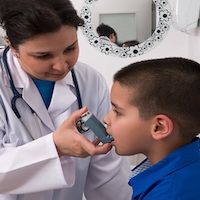Investigators Find Predictors for Biologic Failure for Severe Eosinophilic Asthma
New research show younger age is associated with a non-response to biologic agents.

New biologic agents have improved the management of severe eosinophilic asthma in recent years, but clinically, researchers have observed a heterogeneous response to these therapies, resulting in the occasional need to transition to alternative biologic therapies.
In a new study planned to be presented at the American Thoracic Society (ATS) 2020 International Conference a team led by Reihman, Division of Pulmonary Sciences and Critical Care Medicine at the University of Colorado, examined why some patients do not response to interleukin 5 (IL-5)-targeting monoclonal antibodies.
In the new trial, the investigators examined 42 patients, 32 of which were classified as responders (76%) and 10 of which were categorized as non-responders (24%). Each patient was treated in the University of Colorado’s Severe Asthma Program from 2016-2019 with a clinical diagnosis of severe eosinophilic asthma and 1 or more follow-up clinic visits within 1 year after initiation of biologic therapy.
Patients were considered responders if they continued initial prescribed biologic agent or switch their biologic for a non-clinical reason. Non-responders were defined at participant whose biologic agent were switched because of worsened asthma, worsened sinus symptoms, or side effects caused by the medication.
The investigators performed a subgroup analysis in the subset of patients who failed an anti-IL5 antibody to identify the clinical predictors of treatment failure.
The investigators also tested for differences between responders and non-responders using the Mann-Whitney U and Fisher’s exact test.
In the non-responders group, half failed mepolizumab, while 30% failed reslizumab and 20% failed benralizumab.
The investigators did not find significant differences between the responder and non-responder groups based on sex, smoking status, body mass index, baseline pulmonary function, asthma control test score, fractional excretion of nitric oxide, peripheral eosinophil count, or immunoglobulin E levels.
In the subgroup analysis, the investigators found younger age was associated with mepolizumab and reslizumab (n = 16) biologic failure in non-responders compared to responders (mean age 55 vs 62 years; P <0.05). Non-responders also had an increased number of exacerbations the year prior to biologic therapy initiation (P <0.05).
“In this preliminary analysis, we found one quarter of severe asthmatics initiated on biologic therapy failed treatment and required switch to an alternative biologic agent. 80% of non-responders exhibited treatment failure to an anti-IL5 monoclonal antibody (mepolizumab or reslizumab),” the authors wrote. “Future evaluation of a larger cohort of patients and further investigation of additional biomarkers will allow us to further investigate clinical and molecular predictors for anti-IL5 treatment failure.”
In September, the US Food and Drug Administration approved mepolizumab as the first biologic indicated for children between 6-11 years old with severe eosinophilic asthma.
The 40 mg subcutaneous injection therapy was previously approved as an add-on maintenance drug for patients with severe eosinophilic asthma aged 12 years and older. Its emphasis on the prevention of eosinophil-binding has been shown to reduce eosinophil counts in patients without completing depleting them.
The study, “Clinical Predictors of Treatment Failure to Anti-IL5 Therapy in Severe Eosinophilic Asthma Add to Itinerary,” was published online by the ATS International Conference.